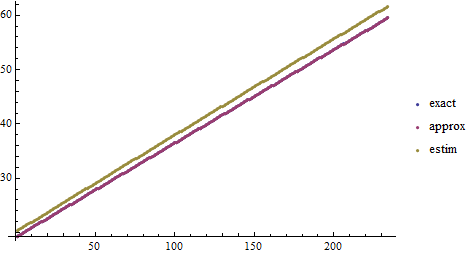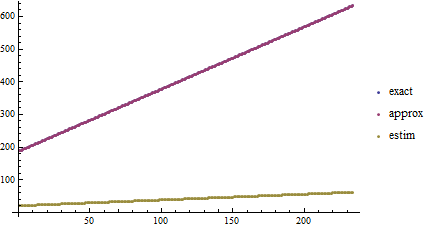There is a way without hypergeometric functions.
Binomial asymptotics is
bin = Normal@Series[Binomial[n - i - 1, 2*n/3 - 1], {n, ∞, 0}, {i, ∞, 0}] // FullSimplify
$\displaystyle\frac{2^{-2 n/3} \sqrt{\frac{1}{n}} 3^{n-i}}{\sqrt{\pi }}$
Approximately sum is integral
sum = Integrate[bin, {i, 0, n/3}]
$\displaystyle\frac{\left(\frac{3}{2}\right)^{2 n/3} \left(3^{n/3}-1\right)
\sqrt{\frac{1}{n}}}{\sqrt{\pi } \ln 3}$
Its asymptotics is $\;\frac{3^n\;2^{-\frac{2n}{3}}}{\sqrt{n}}$.
As a result we have
$$
\frac{2^n \sqrt{n}}{3^n2^{-\frac{2n}{3}}} = \sqrt{n}\left(\frac{2^{5/3}}{3}\right)^n \approx \sqrt{n}\;1.06^{\;n}
$$
Analysis of hypergeometric functions
From Hector answer:
Series[2^n/Sum[2^i*Binomial[n - i - 1, 2*n/3 - 1], {i, 0,
n/3}], {n, ∞, 1}] // FullSimplify // Normal

At the first glance Hypergeometric2F1[1, -(n/3), 1 - n, 2] is a nightmare. However, let us analyze its asyptotics. By definition Hypergeometric2F1[a, b, c, z] is
Sum[(Gamma[a + k] Gamma[b + k] Gamma[c])/(Gamma[a] Gamma[b] Gamma[c + k]) z^k/k!, {k, 0, ∞}]
Hypergeometric2F1[a, b, c, z]
In our case
a = 1;
b = -n/3;
c = 1 - n;
z = 2;
Let us consider one term of the sum above. We are interested in the case when $\ n\!\!\mod 3 = 0$. Gamma is undefined for negative integers but we can take a limit
g = FullSimplify[
Limit[(Gamma[a + k] Gamma[b + k] Gamma[c])/(
Gamma[a] Gamma[b] Gamma[c + k]) z^k/k!, n -> 3 m,
Assumptions -> {m \[Element] Integers, k \[Element] Integers,
m > k > 0}], Assumptions -> {k \[Element] Integers}]

Now we can consider the series about $m = \infty$
s = Normal@Series[g, {m, ∞, 0}]
(3/2)^-k
It doesn't depend on m!
Therefore, Hypergeometric2F1[1, -(n/3), 1 - n, 2] is equal to 3 for big $n$!
Sum[s, {k, 0, ∞}]
3
Numerical verification:
Needs["NumericalCalculus`"]
NLimit[Hypergeometric2F1[1, -Round[n, 3]/3, 1 - Round[n, 3], 2], n -> ∞]
2.99998
As a result the asymptotics is
$$
\frac{\sqrt{\pi n}}{3} \left(\frac{2^{5/3}}{3}\right)^n
$$






